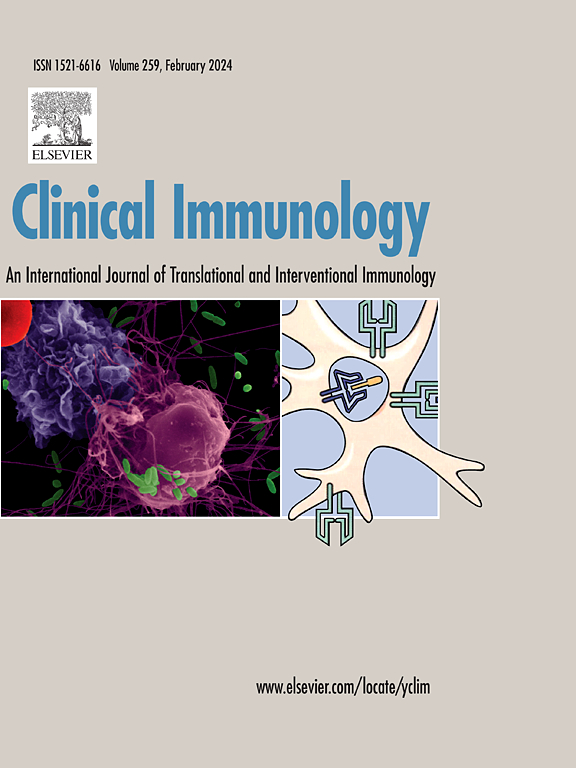JAK抑制剂改善IKZF1单倍不全患者的炎症性肠病
IF 3.8
3区 医学
Q2 IMMUNOLOGY
引用次数: 0
摘要
IKAROS由IKZF1编码,是调节造血和B细胞发育的重要转录因子。虽然IKZF1单倍不全变异与多种免疫疾病相关,但炎症性肠病(IBD)很少被报道。我们报告一例IKZF1单倍功能不全,表现为非典型IBD表型及其对filgotinib的反应。患者先前被诊断为IKZF1单倍功能不全,并表现为慢性腹泻、疲劳和贫血。实验室结果显示叶酸缺乏引起的巨幼细胞性贫血和吸收不良综合征。内窥镜检查显示炎症伴结肠红斑和小肠广泛绒毛变钝。免疫组化分析显示结肠pSTAT3/5升高。考虑到临床特点和JAK-STAT级联增加,开始使用非戈替尼治疗。在治疗后10周,我们观察到内镜检查结果的改善和pSTAT3/5的抑制。本病例扩展了IKZF1单倍性不全的临床谱系。JAK1抑制剂被认为对IKZF1单倍体不足相关的IBD有用。本文章由计算机程序翻译,如有差异,请以英文原文为准。
JAK inhibitor ameliorates inflammatory bowel disease in a patient with IKZF1 haploinsufficiency
IKAROS, encoded by IKZF1, is a crucial transcription factor regulating hematopoiesis and B cell development. While IKZF1 haploinsufficiency variants are associated with various immunological disorders, inflammatory bowel disease (IBD) has been rarely reported. We report a case of IKZF1 haploinsufficiency presenting with an atypical IBD phenotype and its response to filgotinib. The patient was previously diagnosed with IKZF1 haploinsufficiency and presented with chronic diarrhea, fatigue and anemia. Laboratory findings indicated folate deficiency-induced megaloblastic anemia and malabsorption syndrome. Endoscopic examination showed inflammation with erythema in the colon and extensive villous blunting of the small intestine. Immunohistochemical analysis revealed increased pSTAT3/5 in the colon. Considering the clinical features and increased JAK-STAT cascade, treatment with filgotinib was initiated. At 10 weeks post-treatment, we observed improvement in endoscopic findings and suppression of pSTAT3/5. This case extends the clinical spectrum of IKZF1 haploinsufficiency. A JAK1 inhibitor is considered to be useful for IKZF1 haploinsufficiency-associated IBD.
求助全文
通过发布文献求助,成功后即可免费获取论文全文。
去求助
来源期刊

Clinical immunology
医学-免疫学
CiteScore
12.30
自引率
1.20%
发文量
212
审稿时长
34 days
期刊介绍:
Clinical Immunology publishes original research delving into the molecular and cellular foundations of immunological diseases. Additionally, the journal includes reviews covering timely subjects in basic immunology, along with case reports and letters to the editor.
 求助内容:
求助内容: 应助结果提醒方式:
应助结果提醒方式:


